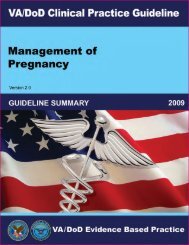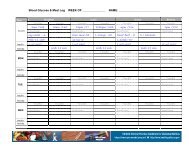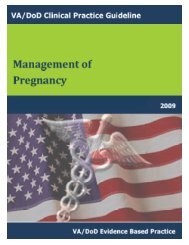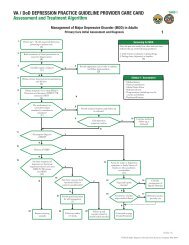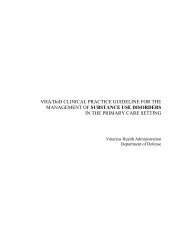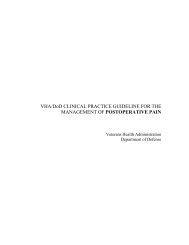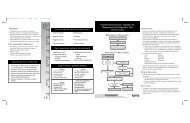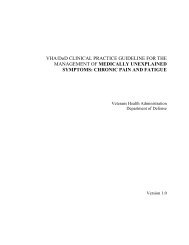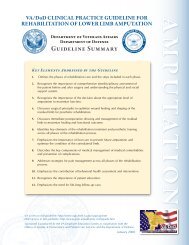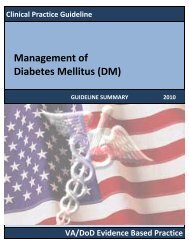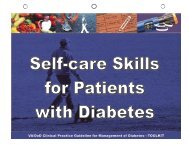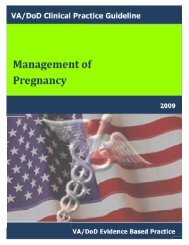DM Full Guideline (2010) - VA/DoD Clinical Practice Guidelines Home
DM Full Guideline (2010) - VA/DoD Clinical Practice Guidelines Home
DM Full Guideline (2010) - VA/DoD Clinical Practice Guidelines Home
You also want an ePaper? Increase the reach of your titles
YUMPU automatically turns print PDFs into web optimized ePapers that Google loves.
Version 4.0<br />
<strong>VA</strong>/<strong>DoD</strong> <strong>Clinical</strong> <strong>Practice</strong> <strong>Guideline</strong><br />
for the Management of Diabetes Mellitus<br />
differences overall in hypoglycemic episodes, hyperglycemic incidents, or hospital admissions. Quality of life was<br />
not shown to be affected by input from a diabetes specialist nurse/nurse case manager.<br />
Norris et al. (2002b) performed a systematic review of the effectiveness and economic efficiency of disease<br />
management and case management for people with diabetes in managed care organizations and community clinics<br />
in the United States and Europe. The evidence supported the effectiveness of disease management on glycemic<br />
control, screening for diabetic retinopathy, foot lesions and peripheral neuropathy, and proteinuria, and on lipid<br />
monitoring. The use of case management in managed care setting for adults with type 2 diabetes in the United<br />
States improved both glycemic control and provider monitoring of glycemic control. Moreover, case management<br />
was shown to be effective when delivered in conjunction with disease management, and with one or more additional<br />
educational, reminder, or support interventions.<br />
EVIDENCE<br />
Recommendation Sources LE QE SR<br />
1 Provision of specialized referrals<br />
when necessary.<br />
3 Use of case manager to improve<br />
outcomes<br />
Aubert et al., 1998<br />
Franz et al., 1995<br />
Sikka et al., 1999<br />
Loveman et al., 2003 §<br />
Machado et al., 2007 §<br />
Norris et al., 2002b §<br />
II-1<br />
II-2<br />
II-2<br />
Fair<br />
Fair<br />
Fair<br />
B<br />
A<br />
I Good A<br />
LE-Level of Evidence; QE = Quality of Evidence; SR = Strength of Recommendation §=Systematic Review (see Appendix A)<br />
G. Reassess and Follow-Up as Indicated<br />
OBJECTIVE<br />
Identify the frequency of patient appointments needed to evaluate educational effectiveness or reinforce<br />
education/self-management skills.<br />
RECOMMENDATIONS<br />
1. When knowledge deficits continue to exist or a large number of lifestyle changes are necessary, frequent<br />
follow-up may be indicated.<br />
2. Recently learned diabetes skills or information should be re-evaluated no longer than 3 months after initial<br />
instruction. One possible method involves follow-up at earlier time points, e.g., 1 month.<br />
3. When appropriate, single behavioral goals should be identified and prioritized to increase the likelihood of<br />
the patient adopting lifestyle changes necessary to achieve treatment goals.<br />
DISCUSSION<br />
The importance of individualization and tailoring sessions to participants’ needs has been amply documented<br />
(Colagiuri et al., 2009; Duke et al., 2009), but there is no definitive evidence to support specific frequencies of<br />
follow-up. Frequency of appointments has been reported from weekly to annually. Frequency of re-assessment<br />
should be based on the patient’s and provider’s perceptions of need. Panel experts recommend that recently learned<br />
diabetes skills or information should be reassessed within 3 months of the initial instruction. When appropriate,<br />
single behavioral goals should be identified and prioritized to increase the likelihood of the patient adopting lifestyle<br />
changes that are necessary to achieve the treatment goals.<br />
H. Does The Patient Want More Information?<br />
OBJECTIVE<br />
Address the patient’s desire (motivation) for additional information.<br />
Module M: Self-management Page 113




